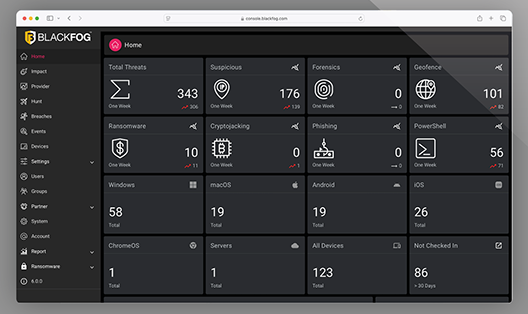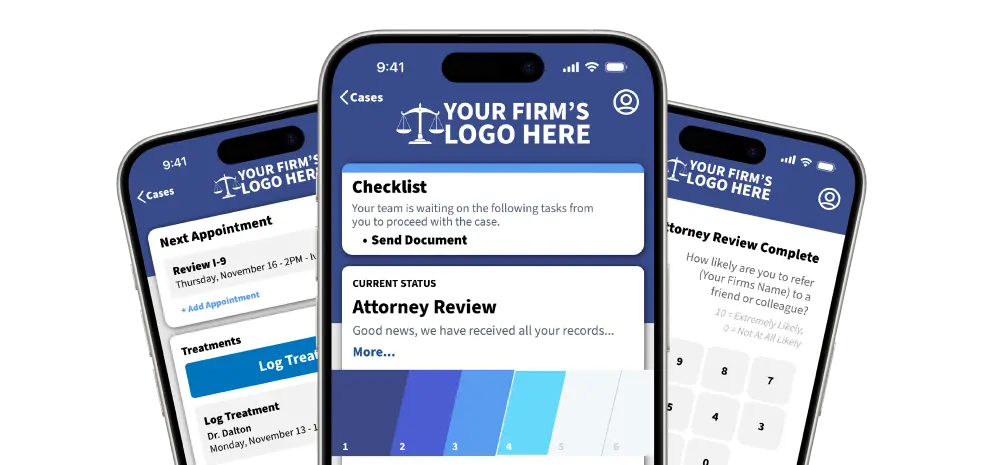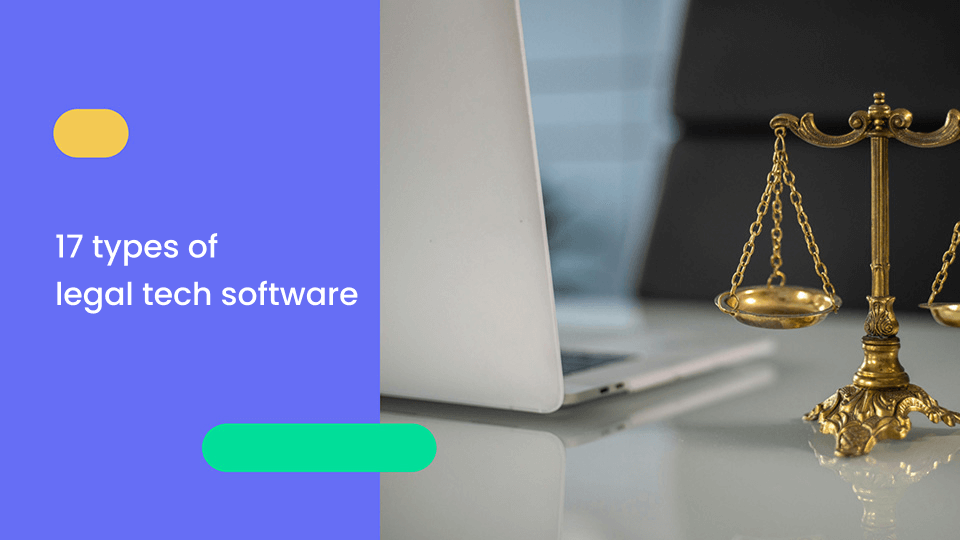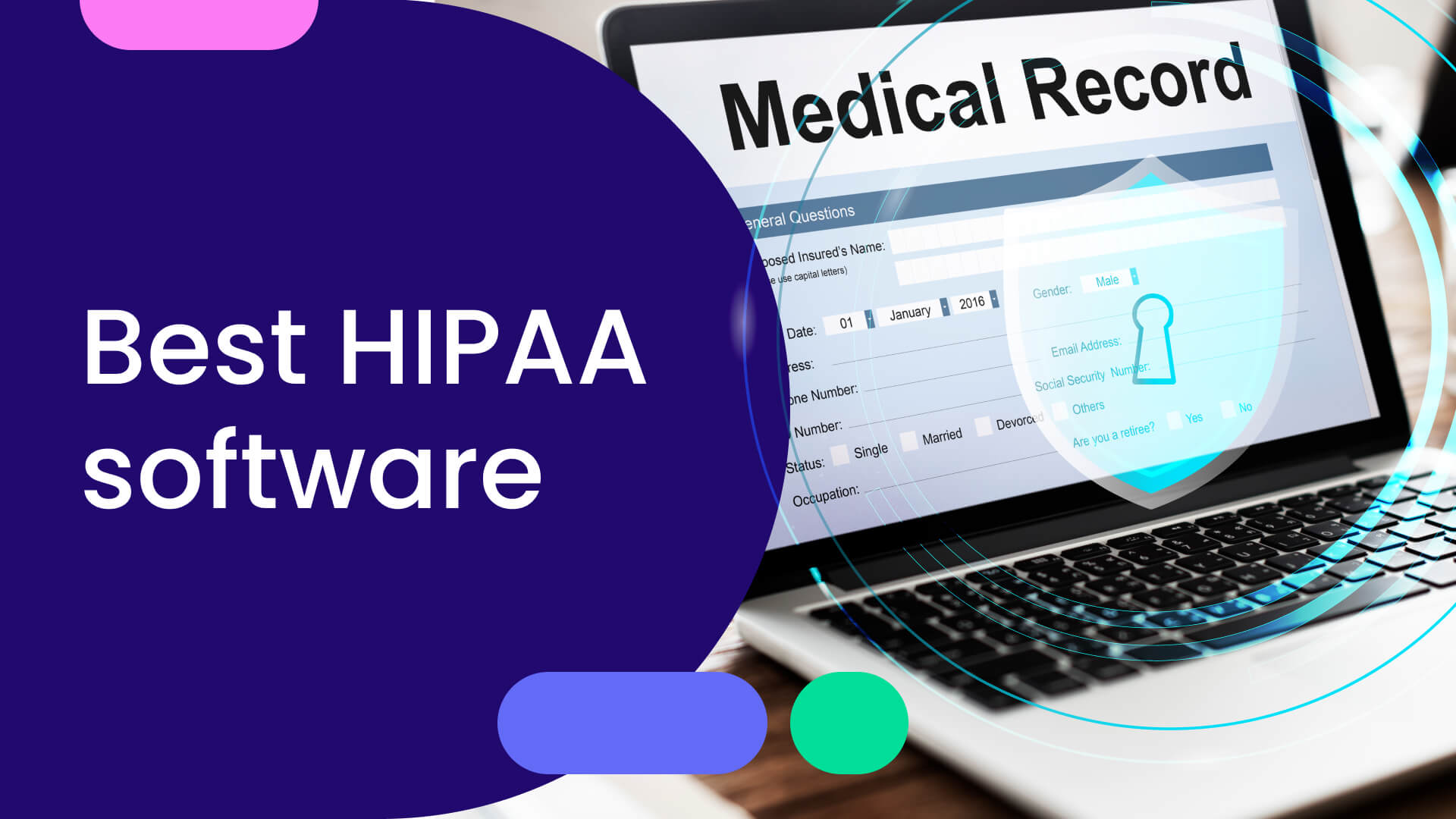Law firms processing thousands of documents monthly face a critical challenge: maintaining accuracy while meeting strict deadlines. Manual document review, contract redaction, and deadline tracking consume valuable billable hours. For legal professionals, inefficient workflows don't just cost money—they risk malpractice claims, missed court deadlines, and client dissatisfaction.
From streamlining document workflows to automating routine tasks, legal tech tools is revolutionizing how law firms operate. Here are 17 types of legal software that are changing how professionals in the legal industry work:
- Law practice management software: Centralizes case tracking, client info, and billing (e.g., Clio, CosmoLex).
- Document management: Simplifies file storage and retrieval with tools like Smokeball.
- Document redaction: Automates removal of sensitive information (e.g., Redactable).
- Legal research platforms: AI-powered tools like Westlaw cut research time by 60-70%.
- Legal CRM Systems: Streamline client onboarding and communication (e.g., Lawmatics).
- Time tracking & billing: Automates time capture and invoicing (e.g., Timesolv).
- Law firm accounting: Handles trust accounting and compliance.
- E-discovery tools: Speeds up evidence review with AI (e.g., Relativity).
- Contract management systems: Automates drafting and tracks renewals (e.g., ContractSafe, Concord).
- Legal writing tools: Simplifies drafting with templates (e.g., HotDocs).
- Legal project management: Tracks case progress and resources (e.g., HighQ).
- Communication tools: Secure messaging and team collaboration (e.g., Mattermost).
- Court calendar software: Automates deadline tracking (e.g., LawToolBox).
- Legal knowledge systems: Centralizes templates, research, and best practices.
- Attorney time management: Optimizes productivity with real-time analytics.
These tools improve efficiency, reduce errors, and help law firms stay competitive. Whether you're looking to automate tasks or enhance client interactions, there's a legal tech software for every need - let's explore them.
What is legal software?
Legal software encompasses specialized applications designed to automate law firm operations and improve attorney productivity. Modern legal technology platforms include case management systems (organizing case files and deadlines), document management tools (secure storage and retrieval), document redaction software (removing sensitive information), billing and time tracking solutions (capturing billable hours), legal CRM systems (managing client relationships), and AI-powered research databases (accelerating legal research). Integration with AI has revolutionized their capabilities to provide automated contract analysis, document review, and letter drafting. Legal tech softwre have become essential to successful practice today, allowing law firms to simplify operations and deliver better client outcomes.
17 types of legal industry software with examples
1. Law practice management software
Law Practice Management (LPM) software simplifies and centralizes law firm operations, covering everything from case tracking to automating workflows. Platforms like Clio, Litify, and CosmoLex are making day-to-day tasks more manageable. Acting as the operational hub, LPM software integrates with other legal tech software to improve efficiency across the board.

Here’s what these tools can handle:
- Case management: Keep all case details, documents, and deadlines in one place.
- Client information organization: Store and access client data securely and easily.
- Workflow automation: Cut down on repetitive tasks and paperwork.
- Financial management: Handle billing and trust accounts directly within the platform.
Modern solutions, like PracticePanther, go a step further by offering secure client portals and two-way texting. These features help law firms maintain clear communication while safeguarding sensitive information.
Different platforms shine in specific areas. For example:
- Clio: Offers cloud-based access and integrates with a wide range of tools.
- CosmoLex: Combines accounting and practice management in one system.
- PracticePanther: Focuses on automated workflows and secure payment processing.
These legal tools also prioritize security and accessibility, making remote work possible without risking data integrity. When choosing an LPM platform, consider:
- How well it scales and integrates with your existing systems.
- The level of customer support and training available.
- Whether it meets your security and compliance needs.
Some platforms, like PracticePanther, include trust account management features such as daily three-way reconciliation, helping firms stay compliant while boosting productivity.
Once practice management is under control, the next step is finding legal tech tools to handle legal documents more effectively.
2. Legal document management
Legal Document Management software simplifies how legal industry firms store and retrieve files. Tools like Gavel and Smokeball have reshaped how legal teams handle documents, cutting down on administrative tasks and improving team collaboration.

These legal software come with features designed to boost efficiency:
- Version control and audit trails: Keep track of edits and access logs.
- Advanced search: Quickly locate files using metadata, tags, or content.
- Access controls: Set permissions to safeguard sensitive data.
What makes a great document management system? Let’s break it down:
For example, firms using Smokeball report reducing document search times by as much as 75% compared to older filing methods.
AI capabilities take it further by categorizing files, pulling out key details, suggesting tags, and identifying potential compliance issues. When choosing a legal tech software, focus on how well it integrates with your current tools, its scalability, ease of use, and adherence to legal standards.
As law firms continue digitizing, efficient document management plays a key role in staying competitive while meeting regulatory requirements.
Once your document workflows are running smoothly, the next challenge is ensuring sensitive information is securely redacted when needed.
3. Legal document redaction tools
Document redaction software enables law firms to permanently remove sensitive information—including personally identifiable information (PII), protected health information (PHI), financial data, and attorney work product—from legal documents before disclosure. Professional redaction tools automate pattern recognition for Social Security numbers, credit card numbers, and other confidential data while maintaining compliance with regulations like HIPAA (healthcare), GDPR (data protection), and Federal Rules of Civil Procedure (e-discovery).. Professional redaction tools like Redactable stand out by using AI-driven workflows to identify and remove private details, such as personal, financial, and medical data, while adhering to regulations like GDPR and HIPAA.

Redactable integrates seamlessly with Clio practice management software and major cloud storage providers, enabling secure document processing within existing legal workflows. The platform offers enterprise-grade features essential for law firms:
Enterprise integration
- Direct connection with Clio matter management
- Native support for Box, Google Drive, Dropbox, and OneDrive
- Secure file synchronization and version control
Advanced security
- Complete metadata scrubbing
- HIPAA and SOC2 Type 2 compliance
- Bank-grade encryption for data at rest and in transit
Quality assurance
- AI-powered pattern recognition for thorough redaction
- Multi-layer verification system
- Detailed audit logs for compliance documentation
This legal tech software transforms document security from a time-consuming manual process into an efficient, automated workflow that maintains the highest compliance standards.
Read also: How to redact legal documents: A guide for law firms
4. Legal research platforms
Legal research platforms act as digital libraries for legal professionals, providing quick access to a wealth of legal resources. Industry leaders like Westlaw and LexisNexis are at the forefront, offering advanced search tools and features.

These platforms improve workflows with several legal tech tools:
Platforms like Westlaw even integrate with tools like Clio, allowing attorneys to link research findings directly to case files and track billable hours seamlessly. While AI in legal research focuses on intuitive searches and predictive insights, it’s different from its role in tasks like document redaction.
Some standout features include:
- Smart suggestions: AI analyzes search behavior to recommend related cases and statutes.
- Interactive timelines: Visual tools that map case histories and how precedents have evolved.
- Cross-jurisdictional analysis: Instantly compares legal interpretations across different regions.
These software make legal research more efficient. For example, an attorney working on intellectual property rights can easily pull up relevant patent decisions, regulatory rules, and academic articles - all from one platform.
By integrating with practice management and document tools, these platforms create smoother workflows for legal professionals. As they continue to evolve, features like data analytics and predictive insights are helping attorneys make better decisions about case strategies and outcomes based on historical trends.
With legal research tools streamlining case preparation, the focus shifts to managing client relationships more effectively through CRM systems.
5. Cybersecurity-focused legal tech software
Law firms have become prime targets for cybercriminals due to the treasure trove of sensitive data they handle—client communications, financial records, intellectual property, and privileged information. According to the 2025 Integris Report, 37% of clients are willing to pay a premium for firms with strong cybersecurity measures, making cybersecurity not just a protective measure but a competitive advantage.
In 2024, 40% of law firms experienced a security breach, highlighting the urgent need for specialized cybersecurity tools designed for the legal industry. Modern cybersecurity platforms like BlackFog, Proofpoint, and Abacus Private Cloud are specifically engineered to address the unique security challenges facing legal professionals.

These cybersecurity-focused legal tech tools provide comprehensive protection that goes beyond traditional antivirus software:
BlackFog: AI-Powered Ransomware Prevention
BlackFog has pioneered Anti Data Exfiltration (ADX) technology that uses advanced AI-based algorithms to filter network traffic and effectively stop attacks in real-time, preventing data exfiltration and lateral movement across networks. BlackFog's research shows that the legal sector was substantially impacted by ransomware attacks in 2024, with attackers targeting firms specifically for their extremely sensitive data worth exfiltrating.
Key features include:
- Real-time threat neutralization: Stops ransomware before it can encrypt systems
- Behavioral analysis: Detects unusual patterns that indicate potential breaches
- Zero-trust architecture: Assumes no network traffic is safe until verified
- Comprehensive reporting: Detailed threat intelligence and attack prevention logs
Proofpoint: Human-Centric Email Security
Proofpoint focuses on protecting organizations' greatest assets and biggest risks: their people, with AI-powered threat detection that addresses the human element of cybersecurity. The platform is particularly valuable for law firms where almost all ransomware attacks originate from email or social engineering.
Advanced capabilities include:
- AI-powered email filtering: Blocks sophisticated phishing attempts before they reach users
- Security awareness training: Specialized programs to help legal professionals recognize and respond to threats effectively
- Data loss prevention: Monitors outbound communications for sensitive information
- Incident response tools: Automated quarantine and threat containment
Abacus Private Cloud: Secure Infrastructure
Abacus Private Cloud provides a fully managed virtual workspace that exceeds the most stringent security and compliance requirements, supporting legal practice management platforms while maintaining enterprise-grade security. The solution is HIPAA and ePHI compliant and ensures data safety through storage in multiple data centers with AES 256-bit encryption.
Core security features:
- Virtual desktop environment: Complete isolation from local security vulnerabilities
- Multi-factor authentication: Biometric signature verification and key code authentication
- Disaster recovery: 100% data availability with mirrored copies and 99.999% uptime SLA
Compliance frameworks: SSAE-16, SOC 2 Type 2, and HIPAA certified
The growing cybersecurity imperative
With 80% of firms having at least one technology policy but only 34% maintaining an incident response plan, many law firms are still lacking in cybersecurity maturity. Emerging threats include cybercriminals acting as 'initial access brokers' who secure unauthorized access to legal firms' systems before selling that access to ransomware groups.
The regulatory landscape is also tightening. Regulators at all levels, including Bar Associations, are prioritizing cybersecurity and implementing tougher standards with more expensive penalties.
When selecting cybersecurity tools, law firms should prioritize:
Integration capabilities: Ensure seamless compatibility with existing legal software and practice management systems.
Compliance features: Look for tools that automatically generate audit trails and compliance reports required by regulatory bodies.
User training programs: Choose vendors that provide ongoing security awareness education tailored to legal professionals.
Incident response support: Select platforms with 24/7 monitoring and rapid response capabilities.
Data sovereignty: Ensure tools maintain data within required jurisdictions and meet client confidentiality requirements.
Modern cybersecurity tools also integrate with document redaction platforms like Redactable to create comprehensive data protection workflows. When sensitive information must be shared externally, proper redaction ensures that confidential data is permanently removed while maintaining document integrity.
With law firms handling increasingly sensitive data and facing sophisticated threats, cybersecurity-focused legal tech software have become essential for maintaining client trust, meeting regulatory requirements, and protecting firm reputation in 2026.
6. Legal CRM systems
Legal CRM systems are changing the way law firms handle client relationships, becoming central to the legal tech landscape. Tools like Law Ruler, Lawmatics, and HubSpot come with features tailored for legal professionals.

Modern legal CRM platforms transform client relationships through advanced features that deliver measurable improvements:
They also integrate seamlessly with other types of legal software, reducing errors and eliminating the need to switch between platforms. Security is a top priority, with encryption and access controls ensuring compliance with regulations like GDPR and HIPAA.
AI features in these tools enhance client service by offering:
- Automated workflows and scheduling that align with court calendars
- Predictive analytics to anticipate client needs and behaviors
Technologies like AI chatbots and predictive tools are making these legal tech software smarter and more proactive. For example, Lawmatics includes detailed onboarding support to help firms take full advantage of these features.
Once client relationships are under control, the focus can shift to precise time tracking and billing.
7. Time tracking and billing
Time tracking and billing software helps law firms manage billable hours efficiently while ensuring clear communication with clients. Tools like Timesolv and Bilr have reshaped how legal professionals handle these processes, making them more efficient and accurate.

These legal tech tools automate billing tasks, aligning with the industry's move toward tech-based solutions. Time tracking platforms also prioritize data security, meeting highest standards with features like secure data transfers, user-specific access controls, and detailed audit trails. Manual timekeeping? This should be a thing of the past.
Once billing is streamlined, the next focus should be using accounting tools to manage the law firm’s finances effectively.
8. Law firm accounting
Law firms today rely on accounting software like ZipBooks, LeanLaw, and QuickBooks to handle legal-specific needs, including trust accounting and IOLTA compliance.

Advanced security measures and remote access capabilities have transformed how law firms manage their finances. When paired with practice management software, these legal tools streamline workflows, cut down on manual entry, and minimize errors.
These legal software use bank-grade encryption and include features like automated backups, role-based access controls, and audit trails to protect sensitive financial data.
Automated trust reconciliation alone can save firms as much as 8 hours each month while meeting the strict compliance standards set by bar associations. A well-executed implementation ensures smooth adoption and avoids costly disruptions.
When choosing accounting software, law firms should look for options that provide thorough training and support, while also integrating seamlessly with their existing software for practice management and billing.
9. E-discovery tools
E-discovery tools are transforming how legal teams handle the discovery process, making it quicker and more precise. Platforms like Logikcull simplify the collection, processing, and analysis of digital evidence, all while ensuring strict chain of custody protocols are followed.

Here’s how these legal software are reshaping electronic discovery:
The demand for e-discovery legal tech software is growing as firms increasingly rely on automated solutions for document review. Platforms like Relativity and Exterro often integrate with case management systems, offering seamless workflows.
Modern e-discovery tools provide features like automated processing, advanced search capabilities, and smart filtering. They can convert various file formats into searchable content, remove duplicates, and filter out irrelevant data - saving both time and effort.
When choosing an e-discovery software, it’s important to look for tools that can handle large cases while remaining easy to use. Cloud-based options are especially useful, offering secure and scalable solutions for managing extensive datasets.
This type of legal software also come with built-in compliance features to ensure legal standards are met and processes remain defensible. Regular updates keep them compatible with new file formats and enhance security measures.
With e-discovery legal tech tools simplifying evidence review, legal teams can turn their attention to streamlining contract management using specialized software.
10. Contract management systems
Contract management systems automate the contract lifecycle - from initial drafting through negotiation, execution, storage, and renewal tracking - addressing a critical pain point for law firms handling hundreds of client agreements, vendor contracts, and engagement letters annually. These platforms reduce contract drafting time by 40-60% through template libraries, clause databases, and automated approval workflows. Legal tech software like Gavel and ContractSafe stand out by cutting down administrative tasks and improving compliance tracking. By automating repetitive processes, these software allow legal professionals to focus on more complex and strategic work.

Contract management platforms have transformed manual contract work into streamlined digital workflows, delivering measurable efficiency gains:
Legal tech software like Icertis use artificial intelligence to analyze contract terms, spot risks, and ensure regulatory compliance. The machine learning capabilities in these software continually improve the precision of contract analysis.
Cloud-based systems add another layer of convenience by allowing secure, remote access. They ensure version consistency and speed up approval processes. Many also integrate with practice management and billing tools. For example, Clio's integration options let law firms centralize all contract-related tasks in one place.
Security is a top priority for these legal software. Features like encryption, access controls, and detailed audit trails protect sensitive client data while meeting regulatory standards.
When adopting these legal tech tools, it’s important for firms to define clear approval workflows and regularly update templates. This helps avoid delays and ensures consistent quality across all contracts.
Contract management systems are also evolving. New features like blockchain for unchangeable records and natural language processing for quicker reviews may shape the future of contract handling.
With contracts under control, the next focus should be improving legal writing and document review processes.
11. Legal writing and review
HotDocs specializes in creating customized templates and automating document assembly, while Clio Draft shines in real-time collaboration with legal tech tools like simultaneous editing and commenting. Together, they integrate with practice management systems to streamline document workflows.

Security is a top priority for these platforms, just as it is for other types of legal software. They use advanced encryption and strict access controls to protect sensitive client data while allowing authorized team members to collaborate efficiently.
To make the most of these tools, firms should define clear document workflows and keep their template libraries updated. Training staff and standardizing formats ensure smooth adoption. Regularly reviewing automation rules helps align them with evolving legal standards and firm policies.
Once document creation and review are optimized, the focus can shift to improving team communication.
12. Legal project management
Platforms like HighQ and Smartsheet are the type of legal sofware designed to tackle the challenges of managing intricate legal cases. They combine tools for tracking cases, allocating resources, and coordinating teams - features tailored specifically for law firms.

These legal tech software are especially useful for handling complex litigation. For instance, Smartsheet streamlines large-scale contract reviews by assigning tasks to reviewers and keeping tabs on team progress, preventing delays.
HighQ offers a centralized platform where attorneys can:
- Track case progress and resource use with visual dashboards
- Share updates with clients securely through dedicated portals
- Manage billable hours and monitor team performance
For the best results, law firms should integrate these tools with their existing document management and billing systems. This setup allows data to flow automatically between platforms, cutting down on manual entry and reducing errors.
Successful implementation also depends on thorough staff training and establishing clear workflows. Starting with a small group of experienced users can encourage adoption across the firm over time.
These legal tech software shine in complex cases, where multiple team members need to stay aligned. By offering real-time updates on case progress and resource allocation, they help firms stay efficient and deliver consistent results while keeping profitability in check.
Once project management is under control, the next focus should be improving communication within legal teams.
13. Law firm communication tools
Effective communication tools are essential for law firms, especially for remote and hybrid teams. These legal tech tools help teams stay connected, improve collaboration, and save time.

Top platforms for legal teams provide secure messaging and integrate with commonly used legal software. With these tools, attorneys can:
- Share case updates in real time and collaborate on documents securely
- Hold virtual team meetings with ease
- Organize conversations by practice area or specific cases
Client portals like Clio are popular for secure communication and document sharing. These portals protect attorney-client privilege and ensure compliance with strict data security standards.
Mattermost stands out for its customizable workflows and strong security features. Its compatibility with practice management software makes it a great choice for firms handling sensitive cases.
To make the most of these software, law firms should invest in staff training, establish clear usage protocols, and properly introduce features and privacy protocols.
14. Court calendar software
Court calendar software (also called legal docketing software) automates deadline calculation and court date tracking to prevent malpractice claims arising from missed filing deadlines. These platforms track jurisdiction-specific court rules - including statute of limitations dates, discovery deadlines, motion filing windows, and appeal periods - automatically adjusting for court holidays, weekends, and local rule variations across federal, state, and municipal courts.
One standout option is LawToolBox, which integrates with Microsoft Outlook. This software automatically calculates court deadlines based on local rules, ensuring accuracy and minimizing mistakes in deadline management.

Modern court calendar software transforms deadline management into a precise, automated system that protects law firms from costly oversights:
Modern software like Clio take it a step further by syncing with practice management tools, allowing seamless coordination of case details, documents, and schedules.
When choosing court calendar software, focus on these key factors:
- Integration: Ensure compatibility with your current practice management systems.
- Automation: Look for features that update deadlines based on court rules automatically.
- Security: Confirm the platform meets legal industry compliance standards to protect sensitive data.
To make the most of these tools, proper staff training and clear calendar protocols are crucial. Regular system audits can help maintain accuracy and compliance.
With scheduling under control, you can focus on organizing legal knowledge and resources for even greater efficiency.
15. Legal knowledge systems
Legal Knowledge Systems act as central hubs for storing and sharing legal expertise within law firms. These types of legal software go beyond simple document storage by creating a searchable repository of institutional knowledge, precedents, and established practices. The goal? Streamlined processes and consistent outcomes across all legal work.
Legal knowledge management systems create a centralized intelligence hub that transforms how firms capture and leverage their expertise:
Modern legal software like HighQ focus on secure access, seamless integration with other legal tools, and advanced knowledge-sharing features. These software are designed to serve as the single, reliable source for all legal information within a firm.

When choosing a knowledge management system, keep these factors in mind:
- Search Features: Opt for systems with powerful search tools that can handle complex legal terms.
- Access Controls: Ensure sensitive information is protected with detailed permission settings.
- Integration: Select software that work seamlessly with your current legal software.
- Mobile Access: Make sure the system is accessible from any device.
To get the most out of these systems, establish clear protocols for updates, naming conventions, quality checks, and user training.
As law firms aim to improve efficiency and maintain a competitive edge, these software have become indispensable. By centralizing expertise, they cut down on research time and help ensure consistent, high-quality results for clients.
Security is a major focus as well. Modern systems come equipped with advanced encryption and compliance tools to safeguard sensitive legal data.
With a solid knowledge system in place, law firms can turn their attention to tools that help attorneys manage their time more effectively.
16. Attorney time management
Attorney time management and billing software addresses the legal industry's billable hour challenge: attorneys average only 2.9 billable hours per 8-hour workday, with 12% of captured time going unbilled due to manual tracking errors. Automated time tracking platforms like HiveDesk and LawPay capture billable work in real-time - including phone calls, document review, emails, and court appearances - while integrating with practice management systems to streamline invoicing and reduce revenue leakage. Platforms like HiveDesk and LawPay offer advanced features that go beyond simple time tracking.
These legal tech software make a noticeable difference. In fact, law firms report an increase in productivity after adopting dedicated time management software. This is critical, especially since the average lawyer billed just 2.9 hours of an 8-hour day, with 12% of those precious billable hours going unbilled.

When choosing time management software, keep these factors in mind:
- Integration capabilities: Ensure the software works seamlessly with tools you already use.
- Mobile accessibility: Pick a platform that allows time tracking on all devices, whether in the office or on the go.
- Reporting features: Use detailed analytics to uncover productivity trends and make data-driven decisions.
Some tools even incorporate AI to predict time entries based on past behavior and flag irregularities in billing. To get the most out of these legal software, law firms should establish clear tracking guidelines, train staff thoroughly, and regularly review time-tracking data. This ensures efficient workflows and accurate billing for clients.
Read also: 10 best software for lawyers
17. Client portals and communication platforms
Modern legal clients expect the same digital convenience they experience in banking and e-commerce. Over 55% of legal clients prefer working with firms that offer digital communication options alongside traditional methods, yet many law firms still rely heavily on phone calls and emails—leading to delayed responses and frustrated clients.
Client portals and communication platforms bridge this gap by providing secure, centralized hubs where attorneys and clients can collaborate efficiently. These legal tech tools transform the traditional attorney-client relationship by offering 24/7 access to case information, streamlined document sharing, and real-time updates that keep clients informed without overwhelming legal staff.

Advanced client communication platforms deliver significant operational improvements for law firms:
Case status: AI-powered client engagement
Case Status leads the market with its client engagement platform designed specifically for law firms. The system integrates seamlessly with existing practice management software to automate client-specific tasks and workflows. Clients using the Case Status mobile app are over 50% less likely to call for updates, significantly reducing administrative burden while improving client satisfaction.
Key capabilities include:
- Automated case milestone updates: Clients receive proactive notifications without manual intervention from legal staff
- Mass messaging functionality: Efficiently communicate with multiple clients about schedule changes or important announcements
- Mobile-first design: Native iOS and Android apps provide clients convenient access to case information
- Feedback collection tools: Automatically gather client satisfaction data to improve service delivery
Case Status recently secured $19.7 million in Series B funding to enhance its AI capabilities for transforming legal client engagement at scale.
Clio for clients: Integrated practice management
Clio offers a comprehensive client portal that integrates seamlessly with its robust practice management tools. The platform is particularly suited for firms needing an all-encompassing solution that includes integrated billing, document management, and client communication in one system.
Advanced features include:
- Real-time document sharing and collaboration: Clients can review, comment on, and approve documents instantly
- Integrated billing and payments: Streamlined financial processes with secure online payment options
- Video conferencing: Built-in virtual meeting capabilities for remote consultations
- Appointment scheduling: Clients can book meetings directly through the portal
Hona: Automated case updates
Hona (formerly Milestones) specializes in automated client communication, delivering exceptional client experiences while limiting unnecessary communication. The platform requires no additional work from legal staff, automatically generating case updates based on practice management system data.
Core features include:
- Dynamic API integration: Syncs with popular case management tools like Clio, CASEpeer, and MyCase
- Transparent case tracking: Step-by-step progress visualization keeps clients informed throughout the legal process
- Automated milestone notifications: Timely updates sent directly to clients without manual intervention
- Firm branding options: Customizable portal appearance maintains consistent brand identity
LawMessenger: Multi-channel communication
LawMessenger was developed by practicing attorneys who wanted more secure and efficient client communication. The platform combines traditional communication methods with modern technology, including AI-powered features for enhanced client service.
Notable capabilities:
- Multi-channel communication: Text, email, voice, and video communication in one platform
- GPT-4 driven chatbots: AI-powered knowledge base integration for website visitor assistance
- Secure billing integration: Combined communication and billing platform streamlines client interactions
- Enhanced efficiency tools: Designed to streamline communication processes and improve client satisfaction
HighQ Client Portals: Enterprise-grade security
Thomson Reuters HighQ provides enterprise-level client portals with advanced security and customization options. The platform is particularly valuable for larger firms handling complex, sensitive matters requiring detailed collaboration.
Enterprise features include:
- Fully encrypted communication: Bank-grade security protects all client interactions and document sharing
- Personalized user experiences: Role-based access ensures clients only see relevant information
- Self-service capabilities: Document drafting, e-signatures, and task management tools
- Advanced analytics: Graphs, charts, and progress trackers provide detailed case insights
Implementation best practices
Successfully deploying client portals requires strategic planning and proper change management:
Staff training: Ensure all team members understand portal functionality and can assist clients with technical questions.
Client onboarding: Create clear instructions and tutorial materials to help clients navigate the new system confidently.
Gradual rollout: Start with a subset of cases or clients to identify and resolve issues before firm-wide implementation.
Integration planning: Ensure seamless connectivity with existing practice management, billing, and document systems.
Security protocols: Establish clear policies for data access, retention, and client confidentiality within the portal environment.
The communication revolution
Client portals represent more than just technological upgrades—they fundamentally transform how law firms deliver legal services. Research shows that firms using modern communication platforms experience:
- Reduced administrative overhead: Up to 50% fewer routine client inquiry calls and emails
- Improved client satisfaction: 24/7 access to case information and proactive updates
- Enhanced security: Encrypted communication channels protect attorney-client privilege
- Better cash flow: Integrated billing and payment processing accelerates collections
- Competitive advantage: Modern clients increasingly prefer firms offering digital convenience
When sensitive documents must be shared through client portals, integration with document redaction tools like Redactable ensures that confidential information is properly protected. This combination creates comprehensive workflows that maintain security while providing the transparency clients expect.
As client expectations continue evolving toward digital-first experiences, law firms that embrace modern communication platforms will be better positioned to attract new clients, retain existing ones, and operate more efficiently in 2026.
Conclusion
Legal technology has evolved from basic digitization to intelligent automation that transforms law firm economics. Integrated legal software ecosystems - combining AI-powered legal research, automated document management, predictive time tracking, and secure client portals - enable firms to increase billable hour realization, reduce malpractice risk, and deliver faster client service. The competitive advantage now belongs to firms that strategically deploy specialized legal tools rather than relying on general-purpose business software.
Modern legal practice demands not just efficiency, but ironclad security. When handling sensitive documents, proper redaction becomes crucial. Redactable leads this space with government-grade security and AI-powered automation, trusted by the US Government and leading law firms.
Experience the future of secure document handling: try Redactable for free today or book a personalized demo with our team to see how Redactable can transform your legal document security.







